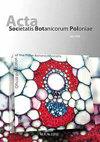Doubled Haploids: Contributions of Poland’s Academies in Recognizing the Mechanism of Gametophyte Cell Reprogramming and Their Utilization in Breeding of Agricultural and Vegetable Species
IF 1.1
4区 生物学
Q3 PLANT SCIENCES
引用次数: 1
Abstract
Diverse processes leading to doubled haploid (DH) plant production, such as microspore embryogenesis, gynogenesis, and distant hybridization followed by genome elimination, are based on the unique ability of plant cells to form haploid embryos without fertilization. All of these are possible because of various in vitro culture systems that enable the growth and development of tissues or single cells outside of the parental organism. The possibility of re-directing cell development from its original pathway to embryogenesis brings several benefits to many research areas, but the most important is the possibility of its implementation in breeding programs. This review summarizes the achievements of Polish research groups in studies of the mechanisms of haploid/DH embryo development and demonstrates the practical applications of these systems in basic studies and plant breeding. It shows the results of studies on economically important crops including barley ( Hordeum vulgare L.), oilseed rape ( Brassica napus L.), triticale (× Triticosecale Wittm.), oat ( Avena sativa L.), rye ( Secale cereale L.), sugar beet ( Beta vulgaris ssp. vulgaris L.), and some vegetable species, including carrot ( Daucus carota L.), onion ( Allium cepa L.), red beet ( Beta vulgaris L.), and members of the Brassicaceae.双单倍体:波兰科学院在认识配子体细胞重编程机制及其在农业和蔬菜品种育种中的应用方面的贡献
导致加倍单倍体(DH)植物生产的各种过程,如小孢子胚胎发生、雌核发育和基因组消除后的远缘杂交,都是基于植物细胞在不受精的情况下形成单倍体胚胎的独特能力。所有这些都是可能的,因为各种体外培养系统能够使亲代生物体外的组织或单细胞生长和发育。将细胞发育从原来的途径重新引导到胚胎发生的可能性给许多研究领域带来了一些好处,但最重要的是它在育种计划中实施的可能性。本文综述了波兰研究小组在单倍体/DH胚胎发育机制研究方面的成就,并展示了这些系统在基础研究和植物育种中的实际应用。它显示了对经济重要作物的研究结果,包括大麦(Hordeum vulgare L.)、油菜(Brassica napus L.)、小黑麦(×,和十字花科的成员。
本文章由计算机程序翻译,如有差异,请以英文原文为准。
求助全文
约1分钟内获得全文
求助全文
来源期刊
CiteScore
2.00
自引率
10.00%
发文量
18
审稿时长
1 months
期刊介绍:
The journal has been published since 1923 and offers Open Access publication of original research papers, short communications, and reviews in all areas of plant science, including evolution, ecology, genetics, plant structure and development, physiology and biochemistry.

 求助内容:
求助内容: 应助结果提醒方式:
应助结果提醒方式:


